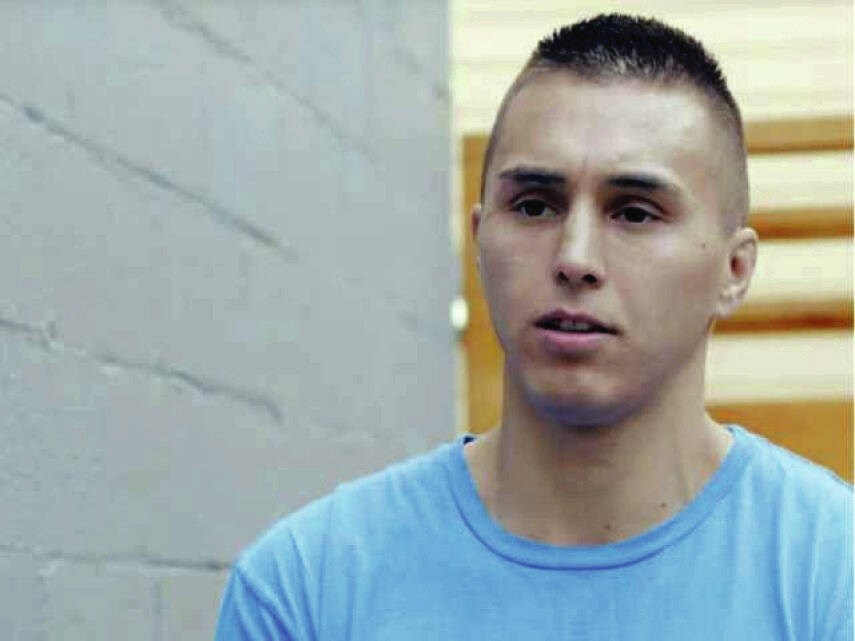A former member of the Devil’s Army Motorcycle Club said he didn’t believe it when a full-patch member told him: “Rick committed a murder.”
“I said: ‘How do you know Rick committed a murder?’ He said: ‘Cause I was there.’ And I didn’t believe him. I basically threw up my arms and said: ‘I don’t want to hear this s—-,’ ” Michael Hargreaves testified Tuesday in B.C. Supreme Court. “He’d done a few lines and was drinking rum. I thought maybe it was the booze talking.”
The 71-year-old is testifying under heavy security at Richard Alexander’s trial for the first-degree murder of Dillon Brown on March 11, 2016.
Hargreaves described a second interaction he had with the full-patch member, who can only be identified as X.
X said he would try to get Hargreaves his full patch early because of the work he was doing at the Devil’s Army clubhouse. But when X came downstairs after a meeting, he told Hargreaves it wasn’t going to happen. “I said: ‘Well what the hell’s going on? You got your patch early and I’ve worked just as hard as you have.’ And he said ‘I was given my patch for something else. I got my patch early because Rick committed a murder and I helped him clean it up.’ ”
Hargreaves said he threw his arms up in the air again. “I’ll be very honest with you. I did not believe him,” he told the jury. His testimony continues today.
The court also heard from Hailey Lagos, one of the last people to see Brown alive. On Tuesday, she admitted that out of fear for her safety, she lied to police during the murder investigation. Lagos bounced between sorrow and anger as she recalled her last meeting with Brown. On March 11, 2016, the usually fastidious Brown showed up at her house around 1 p.m. looking like he had just rolled out of bed. His hair was a mess. He wasn’t wearing his gold chain and he was preoccupied, she recalled.
“I was sweeping and mopping, smoking a joint and chitchatting. He was charging his phone on the couch,” she said.
Brown told her he’d come back and take her daughter swimming around 5 p.m.
Lagos knew Brown had been jumped by bikers at the Voodoo Lounge in Campbell River in November 2015 and was suing the lounge because the bouncers didn’t intervene in the fight.
Brown told her he was settling out of court and would get his money that day. The visit ended when he got a text message and left, she said.
“He said: ‘I’ve got to meet that biker … Ricky.’ He said that as he was walking out the door and I knew instantly who he was talking about,” Lagos testified.
Prosecutor Lorne Phipps noted that she had given a different answer when she testified at a previous trial in April 2021. At that trial, she testified that Brown told her he was going to meet his lawyer.
“Why is that?” asked Phipps.
“Honestly, I think therapy and a s—- ton of weed,” Lagos replied. “This has been a dragged out thing for six years. I’ve realized my own truth is all I have, so I might as well tell it. And I don’t need to be loyal to any street gang. I don’t need to be loyal to anybody but myself in this situation. Previously I was always terrified of the outcome of being involved in something that involved people I don’t want to be affiliated with.”
Phipps asked what Brown’s demeanour was like that day.
“Awful. Stressed, as if Eeyore was a person sitting in the room next to you,” said Lagos.
During cross-examination, Lagos agreed that Brown had a reputation in Campbell River and people would cringe in her presence when his name was mentioned “There was a rumour that he had killed a young man in the bathroom at the Voodoo Lounge,” said Alexander’s defence lawyer Brent Anderson, adding that he didn’t know if it was true. “There was a rumour, yeah,” said Lagos.
Brown did not have a lot of respect for bikers and really disliked them, said Anderson.
“And I think he had fair reason to,” she replied.
When the defence lawyer asked her if Brown had anger issues, Lagos replied that she wasn’t a therapist. “Dillon was a go-big or go-home-type person. He loved hard, he hated hard, he fought hard.”



